The Best Privacy Trees: List of Great Privacy Fence Trees (With Pictures)
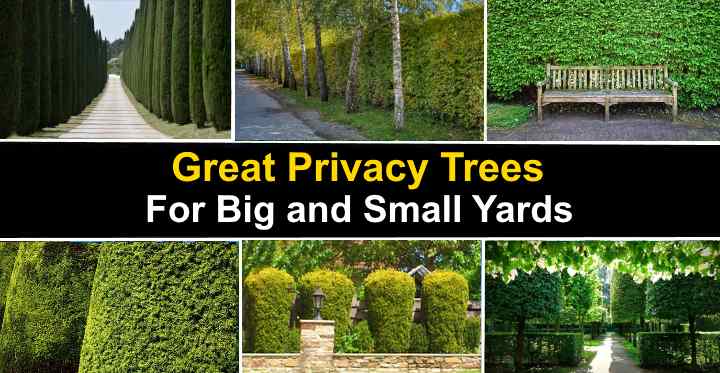
Privacy trees create lush living fences to help screen your backyard from unwanted prying eyes. If you’re looking for some of the best trees for backyard privacy, choose evergreen arborvitae hedging plants. Thanks to their soft, dense foliage, you can enjoy all-year privacy from your neighbors. Other types of popular trees for privacy are evergreen holly trees, juniper trees, cypress trees, and dwarf pine trees.
What are the best privacy trees?
- Lawson cypress (Chamaecyparis lawsoniana)—This cypress species is one of the most popular evergreen trees for privacy. Soft, lush evergreen foliage characterizes this screen tree.
- Eastern arborvitae (Thuja occidentalis)—This evergreen is another common tree used for privacy screens. Grow arborvitae trees in a row to create the ultimate hedge for privacy.
- Dragon lady holly (Ilex × aquipernyi ‘Meschick’)—This type of broadleaf evergreen tree has prickly leaves to deter intruders and also provides privacy thanks to its dense foliage.
- Japanese False Cypress (Chamaecyparis pisifera)—The dwarf cultivar ‘Soft Serve’ is a compact evergreen tree that has a pyramidal shape and it’s an excellent choice as a border tree or a living fence.
- Concolor Fir (Abies concolor)—Excellent tree for large privacy screens, this evergreen creates a dense hedge to offer backyard privacy from curious neighbors.
What are the best fast-growing privacy trees?
- Leyland cypress (x Cupressocyparis leylandii)—This cypress species is one of the fastest-growing privacy trees to create living privacy fences. Lush, soft, evergreen foliage ensures year-long protection.
- Green Giant arborvitae (Thuja plicata)—Arborvitae plants are some of the most popular, fast-growing privacy screen trees. This pyramid-shaped tree grows about 3 ft. (1 m) a year.
- Cherry laurel (Prunus laurocerasus)—One of the few evergreen privacy trees on this list that isn’t a type of conifer. This rapidly-growing hedging plant has large round, glossy leaves to create a perfect privacy hedge.
The Benefits of Using Privacy Trees
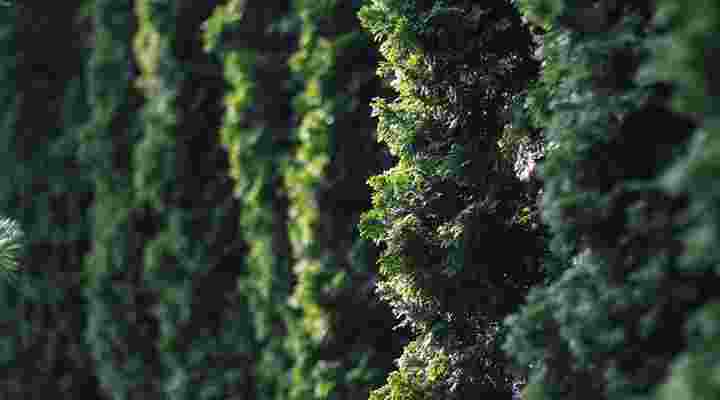
Plant privacy trees in a row to create a beautiful tree fence
Privacy trees are a great addition to any backyard or garden landscape. The benefits of growing trees as living privacy fences are endless: Privacy screen trees provide plenty of year-long greenery in your yard. When grown strategically, they can turn your backyard into a cozy, safe environment to enjoy the outdoors and help block sound and wind.
Planting fast-growing conifers and other evergreen shrubs in a row offers more than just privacy. Here are some other benefits of using columnar trees for privacy:
- The trees greatly enhance the aesthetics of your garden landscape.
- You can plant them along fences to create a living screening hedge.
- Use privacy trees to create a natural sound barrier.
- Privacy hedge trees also protect your yard from strong winds.
What Trees Make the Best Privacy Screens?
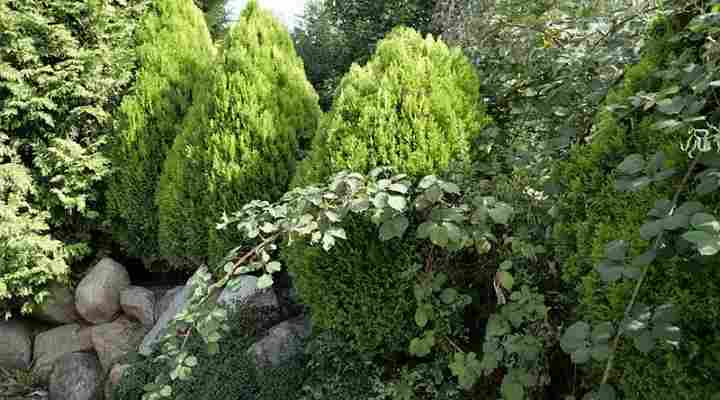
Choosing correctly your privacy trees will ensure your screen trees look beautiful for a long time
Choosing the best type of privacy trees for your backyard depends on several factors.
Let’s look at some of the things to consider when identifying suitable trees for privacy in your garden:
Privacy screen height—Think about how high you need your privacy hedge to grow. Some dwarf and compact evergreen trees grow to about 5 or 6 ft. (1.5 – 1.8 m) and are ideal for privacy in a backyard.
Foliage—The best types of privacy fence trees should have evergreen, dense foliage. These trees will offer protection throughout the year. Many columnar evergreen trees can be planted in rows and will quickly grow into a thick hedge that you can’t see through.
Size of the backyard—If you have a small garden, then choosing tall, skinny evergreen trees will offer the best privacy. The compact nature of fastigiate trees where their branches grow vertically means these types of trees don’t take up much space.
Maintenance requirements—The best kind of privacy landscaping trees are columnar evergreens that have a conical shape. These trees keep their neat shape without much pruning or maintenance.
Growing needs—You also need to consider the climate where you live. Some privacy trees are suitable for full sun and withstand frost. Other types of border columnar trees are better for drought-prone landscapes.
The Best Privacy Trees: List of Great Privacy Fence Trees (With Pictures)
Let’s look in more detail at the best landscaping trees if you want to protect you privacy from neighbors.
Here are some of the best privacy trees:
Brodie Eastern Red Cedar (Juniperus virginiana ‘Brodie’)

The ‘Brodie’ cedar is a drought-resistant tall tree commonly used as a privacy hedge for screening neighbors out
One of the best types of privacy trees is the ‘Brodie’ cultivar from the species Juniperus virginiana. These fast-growing cedars grow up to 45 ft. (13 m) and are up to 10 ft. (3 m) wide. These columnar trees have a compact growth habit with fastigiate branches and erect growth.
It is best to plant these red cedars in a row where they act as a dense privacy screen. The evergreen trees grow rapidly in full sun to partial shade. Due to its neat and compact growth, this eastern red cedar tree requires very little pruning to maintain its shape.
Leyland Cypress (x Cupressocyparis leylandii)
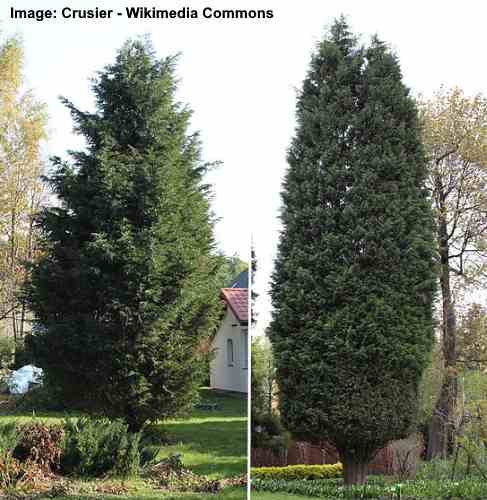
Leyland cypress has many cultivars. The fast growing ‘Naylor’s Blue’ is one of the most popular trees for privacy (its picture is on the right)
The Leyland cypress is a species of fast-growing coniferous tree that is one of the most popular hedging plants for privacy screens. When planted side by side, these evergreen privacy trees create a dense garden hedge. Light, regular pruning maintains its shape, and you can easily create a square boxed privacy hedge and sound barrier.
One reason for the cypress tree’s popularity is that it provides privacy, protects from the wind, and is an excellent screen tree. Regular pruning can keep its height at precisely what you require. The privacy hedge can be as short as 3 ft. (1 m) or as tall as 22 ft. (7 m).
Lawson Cypress (Chamaecyparis lawsoniana)
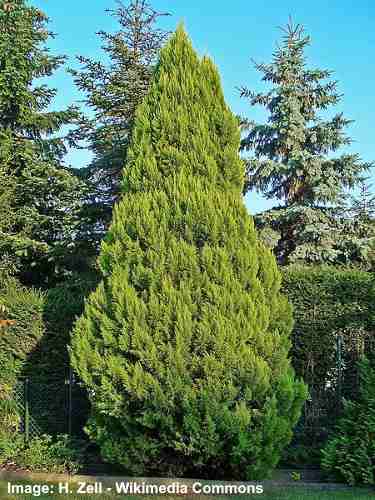
The fast growing Lawson cypress is one of the best trees for privacy
Lawson cypress is a species of columnar evergreen privacy tree, many of which are tall, skinny trees. The soft, dense, lush foliage of these cypress trees are excellent for keeping out noise and prying eyes. Their rapid growth makes them ideal for growing as privacy screens—they grow at 3 ft. (1 m) per year.
Yearly pruning helps keep their height to a manageable size, as some trees can grow as tall as 50 ft. (15 m). If you need a privacy hedge in a small backyard, choose one of the dwarf, compact cultivars.
Spartan Juniper (Juniperus chinensis ‘Spartan’)
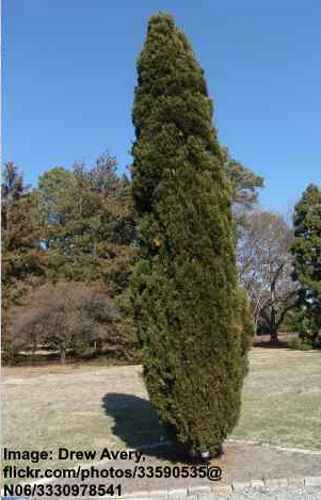
The evergreen Spartan juniper is a popular privacy fence tree used in landscaping
Spartan juniper trees are narrow, columnar trees with an elongated conical shape. These fast-growing trees with fastigiate growth are excellent for creating living privacy hedges and windbreaks. As a species of low-maintenance tree, ‘Spartan’ junipers don’t require any pruning to keep their shape.
All-year-round, dense green foliage keeps out unwanted animals and noise from your backyard. Plant in well-draining soil and full sun to grow this showy privacy hedge.
Moonglow Juniper (Juniperus scopulorum ‘Moonglow’)
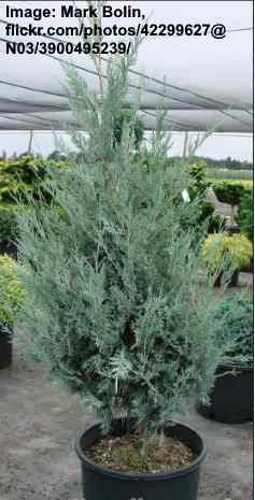
Planting moonglow juniper hedge trees creates an ornamental living fence
This species of juniper, the Juniperus scopulorum ‘Moonglow,’ is a type of columnar juniper that has beautiful silvery-blue foliage. This cultivar is more suited to growing as a privacy hedge than some other types of tall, upright trees. The tree grows to about 20 ft. (6 m) tall and 8 ft. (2.5 m) wide. Plant these junipers together to create massive hedges, large-scale screening, sound barriers, and windbreaks.
Sky Pencil Holly (Ilex crenata ‘Sky Pencil’)
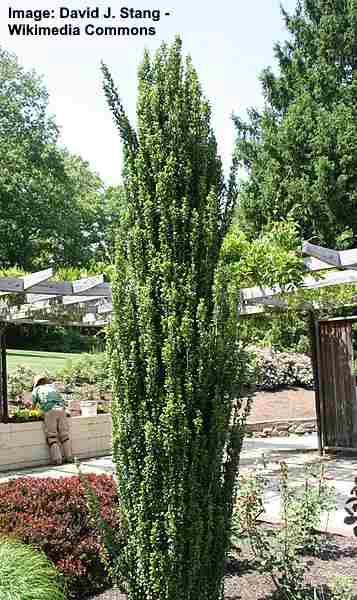
Sky Pencil Holly is an excellent privacy fence tree for both small and large backyards
As its common name suggests, this species of Japanese holly has a tall, thin growth habit. As a fastigiate tree, the ‘Sky Pencil’ holly is perfect for ensuring privacy in small or large backyards. This narrow tree grows up to 10 ft. (3 m) tall and is only 3 ft. (1 m) wide. Some smaller varieties of this columnar evergreen can be as thin as 12” (30 cm) wide.
Plant several of these trees in a row close together to create a glossy evergreen, flowering living fence.
Dragon Lady Holly (Ilex × aquipernyi ‘Meschick’)
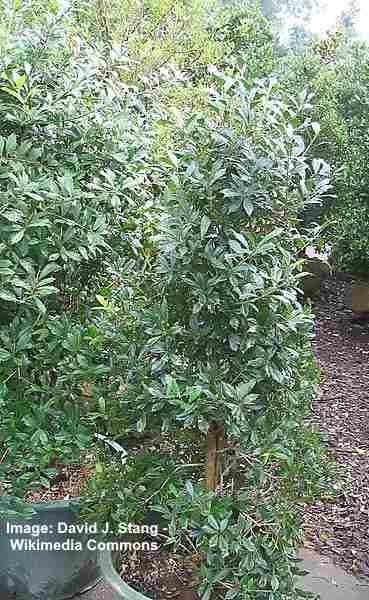
Dragon Lady Holly trees are excellent trees for privacy and also as border trees
Grow dragon lady holly trees along borders, fences, or to shield parts of your backyard. These evergreen, broadleaf hedging plants have small flowers in spring and red berries in winter. This species of privacy tree has a narrow, pyramid shape. The tree eventually grows up to between 10 and 20 ft. (3 – 6 m) tall and is about 6 ft. (1.8 m) wide.
Grow in full sun to partial shade and make sure that the soil is well-draining for your privacy hedgerow to thrive.
Japanese False Cypress (Chamaecyparis pisifera ‘Soft Serve’)
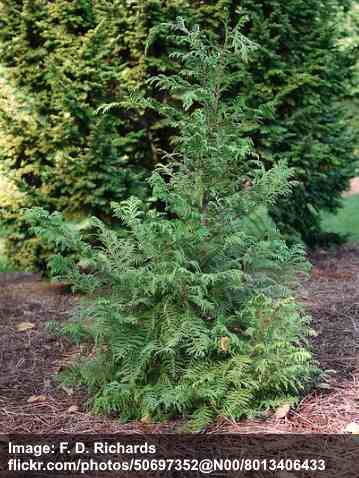
If you have a small garden, then Japanese False Cypress is considered one of the best space-saving privacy fence trees
The ‘Soft Serve’ Japanese false cypress cultivar is a columnar privacy tree with a pyramidal shape. The soft, fern-like branches grace this small compact tree that acts as an effective sound barrier and privacy hedge. Growing along fences, these create a perfect living screen, and the privacy trees keep their color throughout the winter.
Cold-hardy to zone 4, this compact shrub-like conifer grows around 6 or 7 ft. (1.8 – 2 m) tall. Plant along driveways, fences, or walls to enhance your garden landscape.
Hicks Yew (Taxus x media ‘Hicksii’)
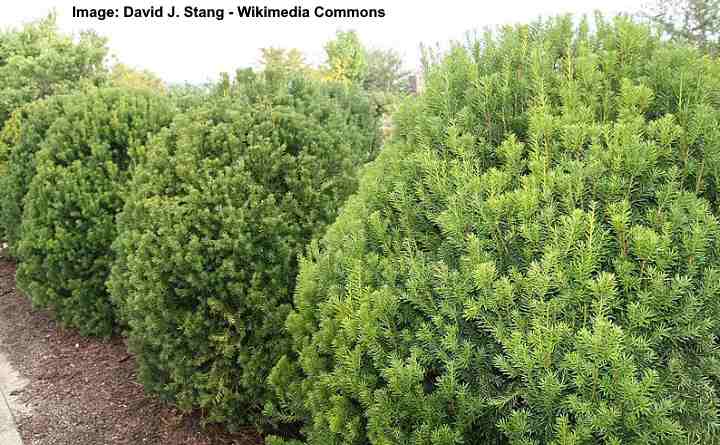
You can prune Hicks yew to create a decorative living fence for privacy from neighbors
The ascending branches of Hicks yew tree make this a perfect evergreen hedge-forming compact tree. Dense foliage is characteristic of this narrowly columnar tree, and it gradually gets wider as it matures. You will often see pictures of this ‘Hicksii’ yew cultivar showing square, boxed hedges protecting well-manicured gardens.
These evergreen trees for privacy hedges grow slowly at only 5” (12 cm) per year. With proper pruning, the glossy, dark green needles add privacy and color to your garden all year long.
Green Giant Arborvitae (Thuja plicata)
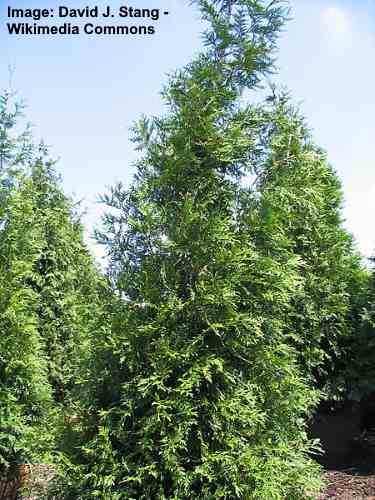
For fast growing living privacy fence choose arborvitae evergreen trees such as the Thuja ‘Green Giant’
Arborvitae trees are some of the most popular species of privacy trees for backyards. These rapidly growing evergreen conifers add to between 3 and 5 ft. (1 – 1.5 m) of height yearly. The Thuja ‘Green Giant’ is also a drought-resistant columnar tree that loves full sun. Planting several ‘Green Giant’ arborvitae plants will soon create the perfect hedge for privacy from neighbors.
Columnar Arborvitae Trees for Privacy Hedges
There are many other types of columnar trees in the genus Thuja that are ideal for planting as privacy screens. Let’s look briefly at some of the most common thujas homeowners plant in backyards for privacy.
- American arborvitae (Thuja occidentalis)—This dense evergreen cedar is a standard privacy tree to block views from nosy neighbors. Even without maintenance, the columnar tree keeps its pyramidal shape.
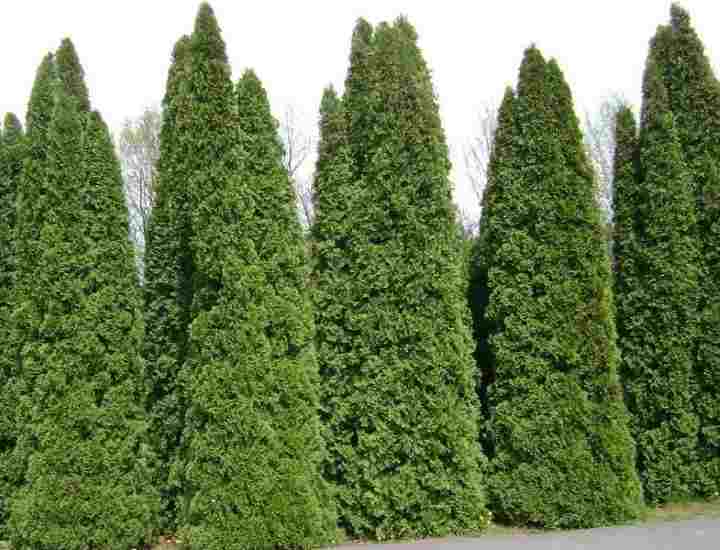
The columnar tall Thuja occidentalis is a popular tree for a living fence or privacy screen
- Arborvitae ‘Emerald Green’ (Thuja occidentalis ‘Smaragd’)—This evergreen tree is popular for creating privacy screens due to its narrow pyramidal shape. It’s also a species of tree that requires little maintenance. Use for windbreaks, borders, hedges, and sound barriers.
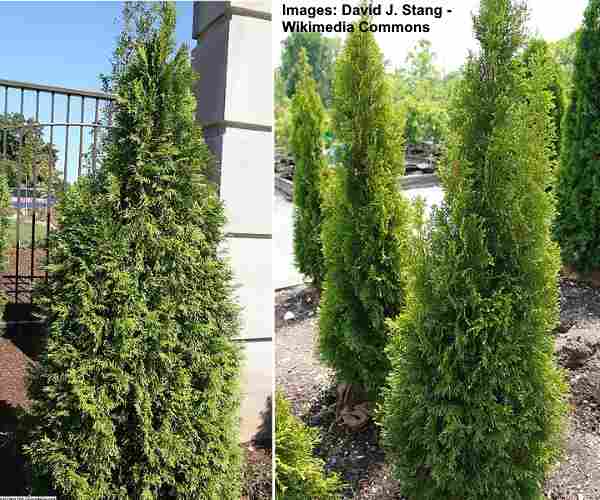
Pictures of thuja ’emerald green’ tree (‘Smaragd’) – it’s considered as one of the best trees for privacy
- Baby giant arborvitae tree (Thuja plicata x standishii ‘Virginian’)—This is a cultivar of the popular ‘Green Giant’ arborvitae. This species has a more compact growing habit that makes it perfect for privacy hedges in small backyards.
Cherry Laurel (Prunus laurocerasus)
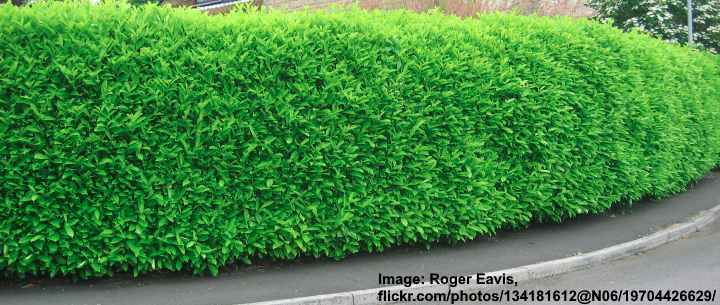
Cherry Laurel is an excellent tree for privacy screen if you live in colder areas
Cherry Laurel is a species of small to medium-sized tree that is perfect for broadleaf privacy hedges. Planting these trees to keep our prying neighbors has the advantage of blooming with creamy white flowers every spring. The dark-green, glossy leaves create a dense living screening fence.
These shrub-like trees are among the fastest hedging plants that are not in the class Coniferae. Within three years, the privacy hedge should reach 6 ft. (1.8 m) in height. These hedging trees grow just as well in shade as they do in full sun. They are also cold hardy down to -4°F (-20°C).
Concolor Fir (Abies concolor)
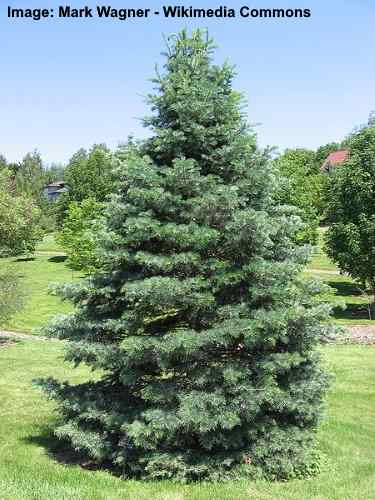
The beautiful foliage of Concolor fir creates attractive privacy living fence – it’s an excellent choice for the backyard
The natural conical shape and dense, needle-like foliage make this evergreen conifer an excellent choice for privacy hedges on large properties. This type of fir tree has a moderate growth rate. The ornamental, pyramid-shaped fir has blue-green needles. Its foliage is excellent for screening, shade, privacy, or for growing as a specimen tree.
Eastern White Pine (Pinus strobus)
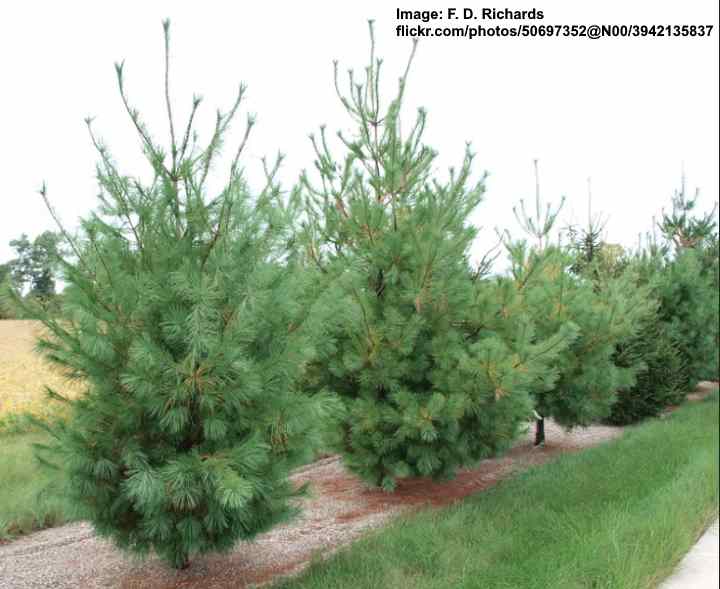
For small backyard privacy hedge, choose a dwarf cultivar of Eastern white pine
Eastern white pine trees have a distinct pyramidal shape that is suited for growing as a privacy fence. Some of the taller pine trees can grow up to 60 ft. (18 m) tall if a tall privacy screen for shade is what you are looking for.
For small, compact backyards, some small or dwarf white pine cultivars may be more suitable for creating a good and effective privacy hedge. Look out for Pinus strobus ‘Nana’ group, Pinus strobus ‘Macopin,’ or Pinus strobus ‘Paul Waxman.’
Due to their pyramidal shape, Eastern white pines are some of the most popular types of Christmas trees.
Lombardy Poplar (Populus nigra ‘Lombardy’)
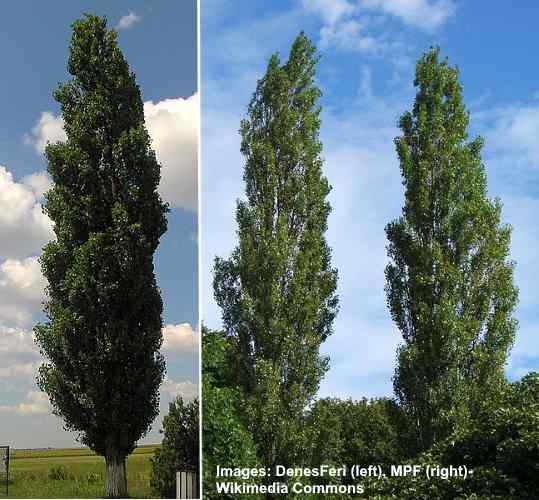
Lombardy Poplar is a common columnar tree for blocking wind or as a natural privacy hedge in large yards
Lombardy poplar trees are quick growers that act as tall, elegant privacy screens in a large backyard. Their upright, fastigiate growth helps to provide shelter and privacy in gardens. These poplar trees are also prized for their ornamental value due to their tall, columnar look and glossy, dark green leaves.
Hybrid poplar
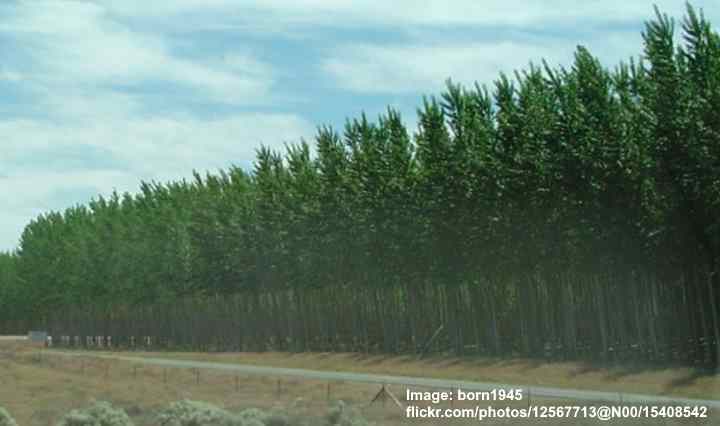
The fast growing hybrid poplar makes it the ultimate tree for creating a tall privacy fence. But it’s mainly suitable for a large backyard
Due to their fast growth, hybrid poplar trees are excellent for creating shade or privacy in a residential backyard. The vertical, fastigiate branches of these tall, skinny trees mean they create excellent living hedges. It’s good to remember that these large narrow fast growing trees grow about 50 ft. (15 m) in only a few years. So, choose wisely where to plant these hardy trees to prevent causing problems with neighbors.
Field Maple (Acer campestre)
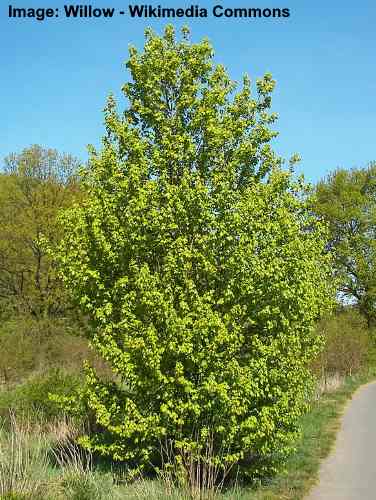
Planting deciduous field maple trees as a living privacy hedge will give stunning color in the fall
Some types of deciduous maple trees are suited to creating privacy hedges and garden screens. These small ornamental trees have beautiful foliage that is emerald green in summer before turning golden yellow in the fall. This maple species grows in most types of soil and thrives in full sun or partial shade.
The field maple can withstand heavy pruning if you want to shape it into a box hedge. The trees grow to between 13 and 16 ft. (4 – 5 m) and can last for hundreds of years.
Fast-Growing Trees for Privacy
When it comes to choosing the best privacy trees, it’s usually essential to consider the growth rate. After all, you don’t want to be waiting many years for your hedge to grow a few feet high.
What are the fastest-growing privacy landscaping trees? Here are five of the best evergreen privacy trees with rapid growth:
- ‘Green Giant’ arborvitae—The arborvitae ‘Green Giant’ grows between 3 and 5 ft. (1 – 1.5 m) annually. The thick, dense foliage blocks views, protects the backyard from wind and snow and creates a natural living hedge.
- Leyland Cypress—One of the most popular fast-growing privacy trees, the Leyland cypress grows an impressive 3 to 4 ft. (1 – 1.25 m) a year. The evergreen tree has fastigiate growth that creates thick, dense foliage—perfect for protecting your garden from prying neighbors.
- American arborvitae—This famous privacy tree, the Thuja occidentalis, grows between 1 and 2 ft. (0.3 – 0.6 m) every year. The beauty of these trees is that they require virtually no maintenance after planting them.
- Spartan Juniper—Growing up to 2 ft. (o.6 m) annually, the ‘Spartan’ juniper eventually reaches 4 ft. (1.2 m) in height. This thickly set tree maintains its pyramidal shape without any pruning.
- Cherry Laurel—This small tree is the fastest-growing evergreen tree on this list that isn’t a conifer. The shiny, green leaves and spring flowers make this an excellent privacy tree to create long, broad hedges and screens.
Related articles:
